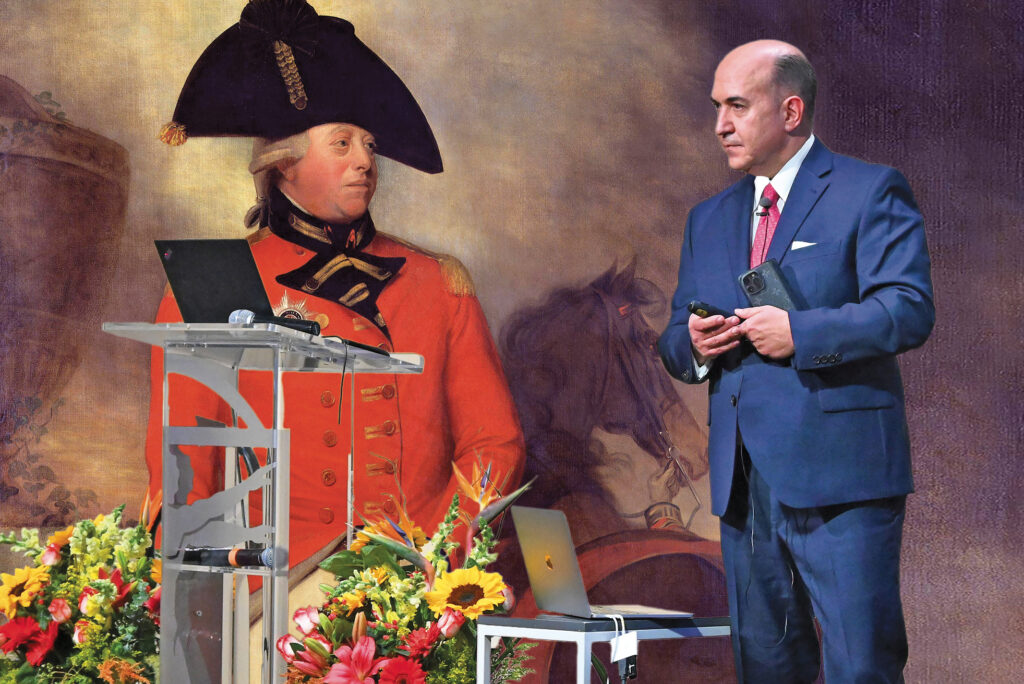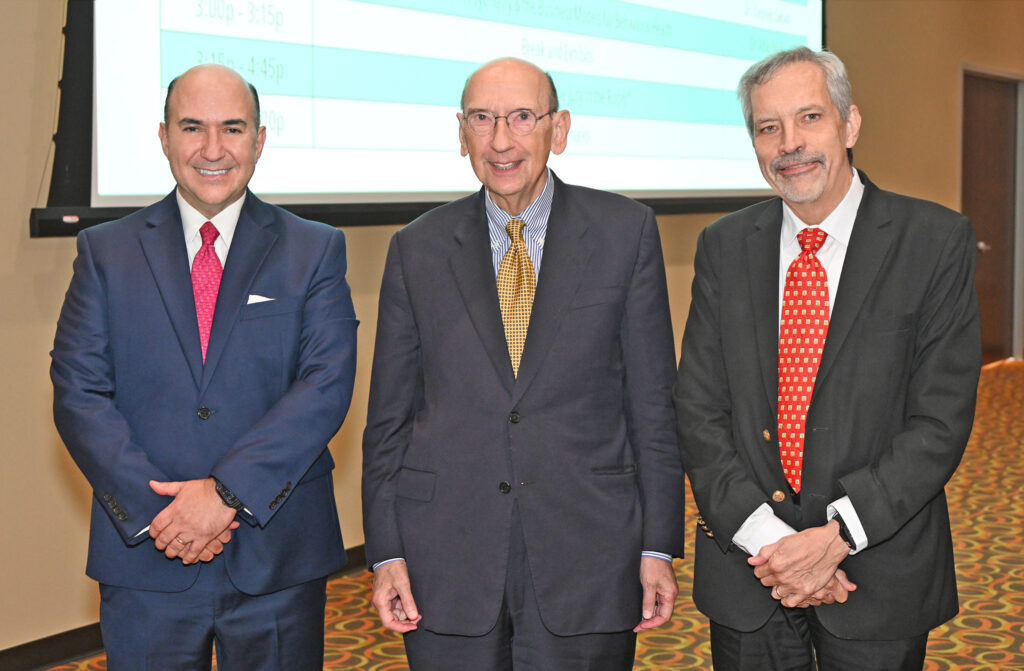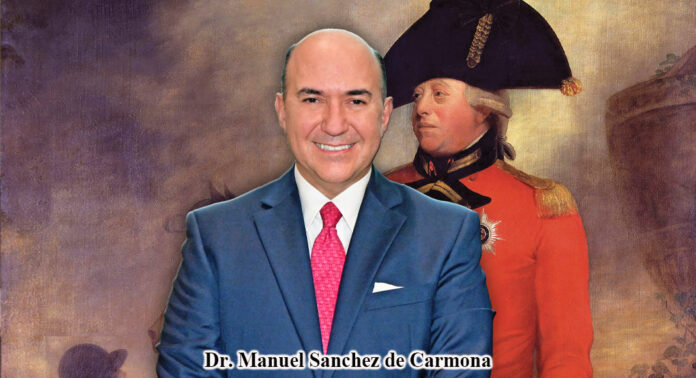Mega Doctor News
By Roberto Hugo González
The 13th Annual International Behavioral Medicine Conference, hosted by DHR Health, unfolded as an authentication to the ever-evolving mental health field. This year’s conference, an encouragement of continuing education for professionals and enthusiasts alike, ventured beyond the traditional boundaries of behavioral medicine to explore the intricate interaction between history, royalty, and mental health, all through the lens of King George III’s legacy.
Known for its dedication to fostering relationships, knowledge, and research, the conference challenged and inspired attendees to explore the complex issues surrounding behavioral health management in clinical practice. It spotlighted the often-perplexing disorders where psychiatric illness masquerades as physical disease, providing tools to manage these conditions more effectively and optimize patient care and outcomes.
Dr. Manuel Sanchez de Carmona, a key figure in the field and a distinguished member of the International Society for Bipolar Disorders (ISBD) Board of Directors, graced the conference as a special guest. His extensive involvement with the ISBD, coupled with over 25 years of clinical experience in treating mood disorders, positioned him as a formidable voice in the discourse on mental health. Dr. Sanchez de Carmona’s passion for education on bipolar disorders and his commitment to combating public stigma against mental health conditions were palpable throughout his presentation.
His exploration of King George III’s mental health provided a unique lens through which to view the intersection of mental illness with historical figures of significant stature. Dr. Sanchez de Carmona illuminated the life of King George III, a monarch who not only played a crucial role in history but also battled with a mental illness that was largely misunderstood at the time. Through an analysis of the king’s letters and personal documents— made accessible to the public in 2015 by Queen Elizabeth II— attendees were offered a rare glimpse into the mind of a ruler whose psychological state has been the subject of much speculation and debate.

King George III, known for his long reign and as the last king to rule America, presented a case study on how mental illness does not discriminate by status or power. The conference dissected his life, from his ascension to the throne at a young age to his passionate involvement in the arts and sciences and, ultimately, his battles with mental illness.
The conference also highlighted the advanced use of computational linguistic analysis to study King George III’s writings, offering groundbreaking insights into his mental state. This method, similar to a modern GPT research style, highlighted the potential of artificial intelligence in advancing our understanding of historical figures’ psychological profiles.
Moreover, Dr. Sanchez de Carmona’s talk ventured into personal reflection, encouraging healthcare professionals to look beyond the surface symptoms and consider the broader context of their patients’ lives. He advocated for a compassionate and comprehensive approach to diagnosis, one that recognizes the individuality of each patient’s experience with mental illness.
As presented at the conference, the story of King George III served as a reminder of the complex relationship between mental health and leadership. It also highlighted the importance of understanding and addressing mental health issues in contemporary society and through the lens of history.
The narrative of King George III, by Dr. Sanchez de Carmona at the 13th Annual International Behavioral Medicine Conference, offered profound insights into the intersection of mental health and historical prominence. This exploration into the monarch’s life, where mental illness intersected with royal duties, left a notable impact on conference attendees. It highlighted the central role of behavioral medicine in not only enhancing patient care and outcomes but also in deepening our comprehension of historical figures’ struggles with mental health issues.
King George III’s story, from his early reign to his engagement with the arts and sciences and his battle with bipolar disorder, provided a compelling case study. It was not merely a recount of historical events, but a narrative enriched with lessons on the diagnosis, management, and implications of mental health conditions.
Dr. Sanchez de Carmona’s presentation accentuated the importance of a comprehensive approach to mental health care, urging professionals to look beyond symptoms and consider the broader context of patients’ lives. His advocacy for a compassionate and individualized diagnostic process resonated with the audience, emphasizing the uniqueness of each person’s experience with mental illness.

As presented, the story of King George III served as a reminder of the complex relationship between mental health and leadership. It also highlighted the critical need for a deeper understanding and more effective management of mental health conditions, both in contemporary society and through a historical lens.
Emphasizing progress in psychiatric care, Dr. Sánchez de Carmona states, “The encouraging news we have today is the availability of effective treatments.” He humorously contrasts current advancements with historical practices, remarking, “We have moved beyond antiquated methods such as cupping or leeches—remedies once prescribed to figures like King George.”
Dr. Sánchez de Carmona’s reflections extend beyond the evolution of treatment to the profound understanding of mental illness through historical contexts. He notes, “As I revisit the topic of King George III, I’m captivated by the historical insights into mental health, particularly the significance of recognizing these conditions as enduring. It’s crucial to acknowledge that these illnesses often start before the age of 18, predominantly in adolescence. The narrative of King George illuminates the intricate relationship between bipolar disorder and a blend of creativity, vigor, intelligence, and, inevitably, mental challenges. Even three centuries later, his correspondences offer a window into his struggles, enhancing our comprehension of his mental state.”
He further explains the historical recurrence of bipolar disorder among England’s leaders, underlining its impact regardless of status. “King George’s ordeal emphasizes that bipolar disorder can afflict even the most formidable individuals. Another notable figure, Prime Minister Sir Winston Churchill, also battled this illness. Their stories exemplify how two eminent leaders, respected for their visionary contributions, navigated their lives with bipolar disorder, marking their indelible impact on history.”
Dr. Sánchez de Carmona concludes with a powerful reminder from Churchill himself: “Keep calm and carry on, and let’s move forward.” This message encapsulates the resilience required to face mental health challenges, advocating for continued progress in understanding and treating mental illnesses. Dr. Sánchez de Carmona’s presentation reminds us of the critical intersection of history, leadership, mental health, and the ongoing journey toward better mental health care.
As the conference drew to a close, the legacy of King George III and Dr. Sanchez de Carmona’s insights left an unforgettable mark on the attendees. The event not only played a vital role in behavioral medicine in improving patient care and outcomes but also enriched our understanding of how figures like King George III navigated the challenges of mental illness. In doing so, the 13th Annual International Behavioral Medicine Conference effectively bridged the past and present, offering invaluable lessons for the future of mental health care and advocacy.












